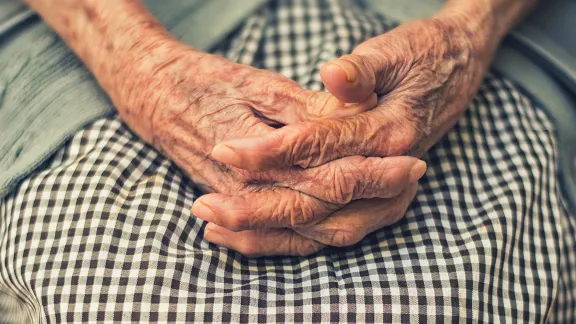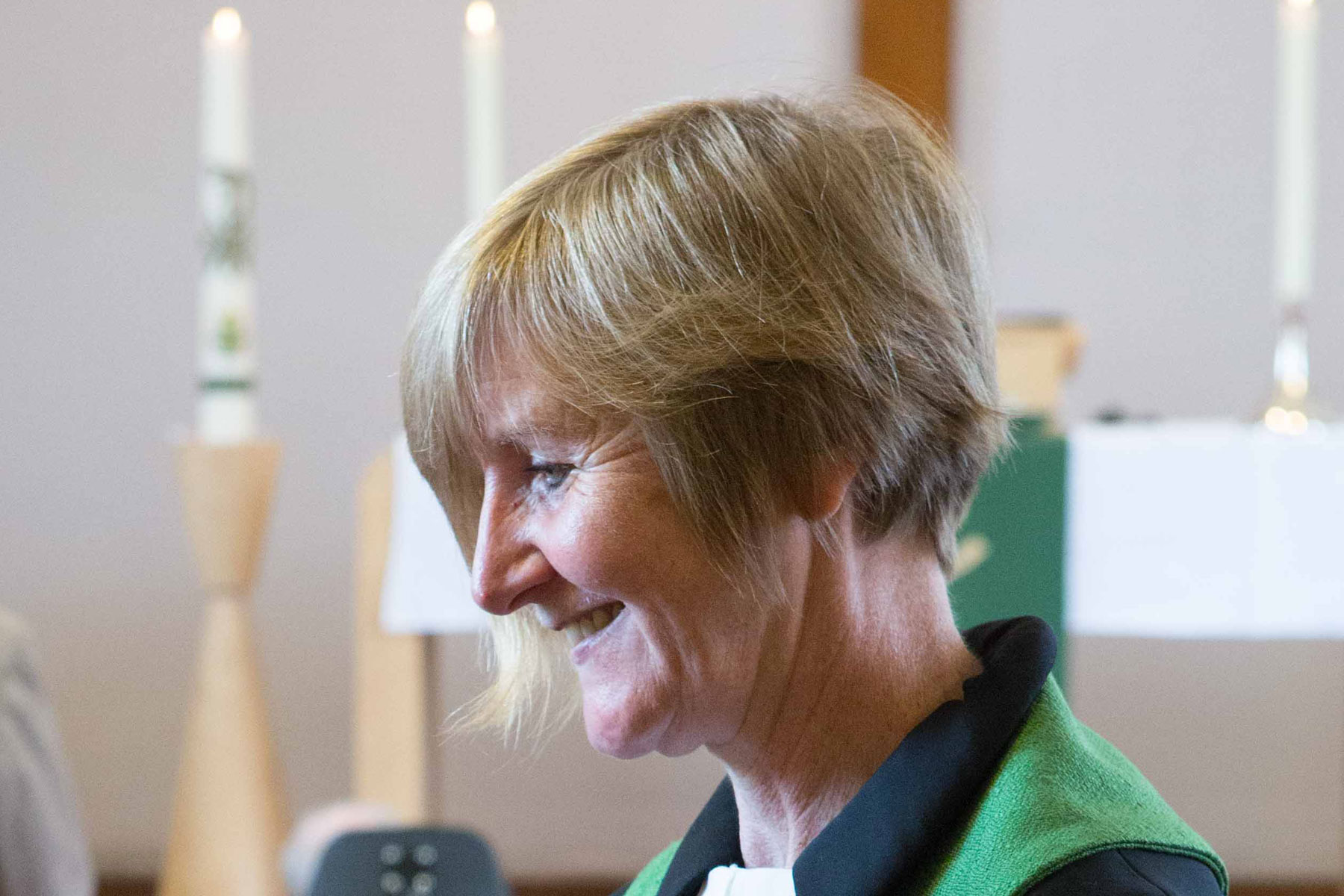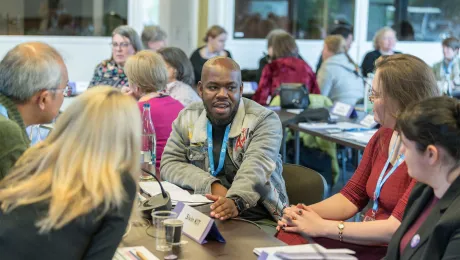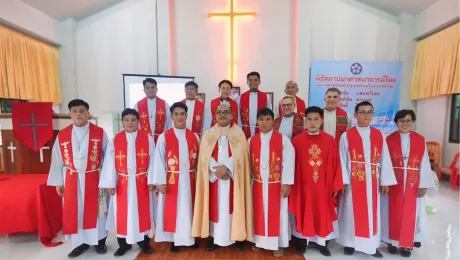
Rev Kersten Storch is a spiritual counselor with the Protestant Church in the Netherlands who works in a home with people living with dementia. Photo by Cristian Newman on Unsplash
Voices from the Communion: Rev. Kersten Storch
(LWI) – Restrictions to contain the Coronavirus disease (COVID-19) pandemic have forced people around the world to self-quarantine in their homes and to maintain social distance. Protestant Church in the Netherlands (PKN) pastor, Rev. Kersten Storch leaves her house daily to work with residents at a home for the elderly.
Leaving no-one behind, Storch, a spiritual care counselor, specializes in the spiritual wellbeing of people living with dementia. The Wartburg home is 30 minutes outside of Amsterdam and has assisted apartment homes for 120 aging residents, of which 24 live in special residential groups, because of the care they need living with dementia.
Loss of memory and difficulty understanding what people are saying are two of the challenges faced by people living with dementia. Depending on the stage of the disease, people may or may not understand COVID-19, and why their routine visitors are no longer coming to visit.
Do your residents understand why no one is coming to visit?
Out of the group there might be two who understand the [COVID-19] situation very well. They are watching TV and understand what they are hearing because they are not in the advanced stages of dementia.
There are some who understand slightly, but they forget it and have to be retold what is happening often. Then we have those who don’t understand anything about what is happening. It has been my experience working with people with dementia that their emotions and feelings become more acute. Therefore, this last group can sense clearly that something is going on but the brain cannot process beyond the emotion. This leads to a sense of fear, insecurity and of feeling lost.
How do caregivers calm them?
In all situations of uncertainty and hectic circumstances, it is the goal of the caregiver to create as much normalcy as possible; to continue the daily routine. For example, if the daily routine is that a client’s husband normally comes to visit in the afternoon, but now cannot visit, this is a break in the routine. It is essential that we are strict about other routines, for instance eating at the exact same time and scheduled time to walk around inside the facility. The reality is that it is no longer possible to have normal days, but our challenge as caregivers is to create as much normality as possible.
How can a routine replace the visit of a loved one?
It doesn’t replace a relative, of course, but this leads to why it is important that I continue to come to the home. I have become a familiar face. Every time I come, they see me and they know that there is a connection.

Rev Kersten Storch is a spiritual counselor with the Protestant Church in the Netherlands. Photo: PKN
Also, it is easy with me because they simply refer to me as “The Pastor” - a title. It relieves them of the stress of remembering names. My familiarity points to a pattern from their past; the typical way one would have addressed their pastor in their youth. I represent the ministry, the church; they know the church.
Isolation due to the Coronavirus can be especially difficult for the families, do you offer family counseling?
Partly. The local parish supports our service by assisting the family members. They have a very good network of caregivers for the family. We don’t have the capacity to counsel the residents and their families during the difficult circumstances. I will assist by being available to families on WhatsApp and email to answer questions about their loved ones.
How has worship changed since COVID-19?
At the Wartburg home we celebrate Sunday service in the chapel on the grounds. I have a musician, a council member and a technical person and we offer live service from the empty chapel and clients participate from their apartments at the home, nearby. It took me two weeks to learn the technical process of offering a live service but finally my team has helped me manage it.
Do you feel at risk of contracting the virus at work?
The Wartburg has no known cases.
If someone tests positive the entire unit will be closed down, and even I am prevented from going inside. Honestly, it presents an ethical problem. What do we do with an infected client in a unit with 8 or more people who might not understand? How then do we protect the rest of the unit? We do not have all the answers, but I am the chairperson of the ethical committee with the company of these homes and we are working hard to come up with solutions. Even outside of the committee, the entire staff, nurses, aides and housekeepers are contributing to ways to prepare for positive cases.
What led you to work with the elderly and people with dementia?
It is a human and Christian obligation to care for them. Human beings care for each other. It can be a challenge because caregivers have to learn a different language when language doesn’t help anymore. As dementia advances and words become difficult to recall and disconnected, communication becomes restricted. This summons the caregiver to rise to another level of communication - either through emotions or visually.
It is about living in the moment. As mentally healthy people we are always moving toward something but the goal for people living with dementia is to be present in the moment, in the most vulnerable way. I have learned from them so much about myself. Caregivers must ask: Am I open to what comes? What are my limits?
Ultimately, this is fascinating and rewarding work.
How does ministry with the elderly feature in the work of the Protestant church in the Netherlands?
Counselors and caretakers have always raised our voices to call on the church to be faithful witnesses to the elderly. PKN is giving attention to this work with the elderly and last year initiated a discussion about developing dementia-friendly services. Frankly, there are quite a few elderly people who belong to the church so there had to be some initiatives toward this demographic. Another example of how the church is responding can be seen on its website where the PKN calls for volunteer spiritual caregivers during the COVID-19 pandemic.
Any tips for church members who want to help those in dementia care during the COVID-19 pandemic?
- Telephone calls
- Send a card or flowers
- Send prayers
- Reach out to those who have family members in dementia care or homes
These are ways to offer signs and symbols that they are not forgotten.
The Lutheran World Federation is a global body that shares the work and love of Christ in the world. In this series, we profile church leaders and staff as they discuss topical issues and set out ideas for building peace and justice in the world, ensuring the churches and communion grow in witness and strength.
*Photo by Cristian Newman on Unsplash


